Today a future without schools. Instead of gathering students into a room and teaching them, everybody learns on their own time, on tablets and guided by artificial intelligence.
First, I talk to a Ashok Goel, a computer scientist who developed an artificially intelligent TA named Jill Watson and didn’t tell any of his students she wasn’t a human.
Then I talk to two people building future, app based educational systems. Jessie Woolley-Wilson from DreamBox explains what adaptive learning is, and how it can help create a better learning experience for kids. She also talks about all the data they collect on kids to better serve them (data we’ll come back to later in the episode.) Along with Jessie, Julia Stiglitz from Coursera explains how this kind of self-directed learning can extend into the college and post-college world.
Jessie and Julia see a future with these kinds of learning apps that could be more democratic, more creative, more fun and more effective. But there are some downsides too. Neither of them see apps or algorithms replacing teachers, but there are other organizations and projects that do.
In 2013, a guy named Sugata Mitra won the TED Prize which comes with a pretty healthy million dollar check. He won this prize for his work on what he calls “A school in the cloud.” Mitra founded this organization named Hole in the Wall, where he went around the slums of India and installed these kiosks that children could use and play with. His whole thesis is that students can be taught by computers, on their own time. Without teachers. Here’s his TED talk.
And this Hole in the Wall thing is one of the classic examples that a lot of people working on education apps point to to show that kids don’t need teachers to learn. Kids are naturally curious, they’re going to want to seek out information, you don’t have to force them into a tiny room to listen to a boring teacher.
But we talk to some people who question that narrative. Audrey Watters, who runs the site Hack Education, says that projects like Hole in the Wall often don’t last. Nearly all the kiosks that Mitra set up are abandoned and vandalized, she says, and when you look at footage and images of the kiosks you can see that older, bigger boys dominate and push the smaller boys and girls out.
And get this to a question that came up with literally every person I talked to for this episode. What is the purpose of school? Is it to teach content? Or is it to teach students how to relate to one another, how to empathize, how to think, how to be good citizens? Nobody really knows. But we talk about it on the episode!
We also talk about some of the other downsides of these systems. Jade Davis, the associate director of digital learning projects at LaGuardia Community College in Queens New York, tells us about her concerns that algorithms might pigeonhole Kids who might not take to the system immediately. Kids like her own.
In the end, we talk about whether or not these kinds of solutions are really for everyone. Or if they’re just going to be used on poor, disadvantaged kids. Because, are Harvard students really going to be taught by robots? Probably not.
Bonus: Listen to the very end for a fun surprise.
Further reading:
- The Algorithmic Future of Education by Audrey Watters
- Technology Imperialism, the Californian Ideology, and the Future of Higher Education by Audrey Watters
- Exploring Virtual Reality in Education by Jade Davis
- Education and the Cult of Efficiency by Raymond E. Callahan
- The Children’s Machine by Seymour Papert
- Towards a Pedagogy for Everyone (Not Just the “Oppressed”): The Engaged Classroom Today by Cathy Davidson
Flash Forward is produced by me, Rose Eveleth, and is part of the Boing Boing podcast family. The intro music is by Asura and the outtro music is by Broke for Free. The break music is by M.C. Cullah. Special thanks this week to listeners who sent in their kiddos for the intro — that’s Ari, David, Kevin, Sharon, Beth, Kim and Nav. The episode art is by Matt Lubchansky.
If you want to suggest a future we should take on, send us a note on Twitter, Facebook or by email at info@flashforwardpod.com. I love hearing your ideas! And if you think you’ve spotted one of the little references I’ve hidden in the episode, email us there too. If you’re right, I’ll send you something cool. Oh and one the survey some of you have asked what these references are that I’m talking about! If you go to flashforwardpod.com/references you’ll see a list of past hidden gems from season one so you can see what you should be looking for.
And if you want to support the show, there are a few ways you can do that too! We have a Patreon page, where you can donate to the show. But if that’s not in the cards for you, you can head to iTunes and leave us a nice review or just tell your friends about us. Those things really do help.
That’s all for this future, come back next week and we’ll travel to a new one.
▹▹▹▹▹▹▹▹▹▹▹▹▹▹▹▹▹▹▹▹▹▹▹▹▹▹▹▹▹▹▹▹▹▹▹▹▹▹▹▹▹▹▹▹▹▹▹▹▹▹▹▹▹▹▹▹▹▹▹▹▹▹▹▹▹▹
TRANSCRIPT
Rose: Hello and welcome to Flash Forward. I’m Rose and I’m your host. Flash Forward is a show about the future. Every week we travel to a different possible, or not so possible, tomorrow.
Before we start this week I wanted to just thank everybody who took the listener survey and talk about a few things that came up in it. So, one big thing many of you said was that there are these weird long pauses. Here I was thinking that I was doing fancy sound design with these very low ambient noises but apparently you can’t hear those! So I’ll cut that out, and hopefully the pauses will go away.
Another thing a lot of people asked about was why there is now a musical break in the middle of the show. The reason that’s there, and this is a little bit of inside baseball podcast stuff, but basically I have ads on the show. And some of those ads get placed in the middle of the show. And they’re dynamic ads, which means that I put a little marker where the ad goes, and different ads get dropped in at different times. So if I didn’t have the musical break, you’d just get BOOM an ad right there in the middle. And sometimes the ad marker can get a little funny, so I need to leave a little space on either end to make sure it’s not cutting off a work or doing something weird. Which is why there’s music there. I’m trying to come up with a more elegant solution, but, for now that’s what it is.
Okay, two last things. I asked what kinds of rewards I might be able to offer to entice you to donate to the show. And a lot of you actually put down things that I already offer on Patreon! Which means that I haven’t done a good job telling you what the rewards are! If you donate $1 an episode, you get access to transcripts and bonus full interviews from certain futures. If you donate $2 an episode you get access to all that, and a special fan only newsletter that’s full of links and often pictures of my dog. If you donate $5 an episode you get all of those things, and every other week you get a short story about a future we’ve traveled to. And if you donate $10 an episode, you get all those things AND your voice gets to be in a future scene. ALSO for those of you who wrote in saying you hate the ads, I’ve got something for you as well. If you become an Acast+ member, which costs $5 a month, you get an ad free show. You can get all the info about Acast+ and become a member at Acast.com/plus.
And finally! Transcripts. Enough of you said you’d like transcripts of the show that I’m going to start posting them. I’m not exactly sure how I’ll do this yet, because I want them to be easy to read and not super cumbersome, but in the next couple of weeks you’ll get transcripts of at least this season’s episodes. The transcripts I have for last season’s episodes are not very good so I’ll need to figure out how to get those up to snuff. But stay tuned, this will happen, and when it does I’ll let you know.
OKAY enough blah blah from me, let’s go to the future! Let’s start this episode in the year 2099.
Computer voice: Hello there Kara, welcome to school today. I hope you’re ready to learn!
Computer voice: Today we are going to continue our lessons on trigonometry. Did you watch the homework video?
Computer voice: Hello Kara, let’s continue our lessons on American History. Please upload your essay on reparations to the portal.
Computer voice: Hello Kara. I have read your essay on reparations, let’s discuss. Please turn on your webcam.
Computer voice: We have identified some key points in your essay for discussion. It seems that perhaps you did not do some of the assigned reading. Did you read the Atlantic essay in your homework packet?
Let’s go over it together. We’ll start of page 3 of the assigned essay.
Computer voice: Hello Kara, we haven’t detected any movement in front of the screen in a while. Are you still there?
Computer voice: Hello Kara, your tracker indicates that you haven’t been at the computer during lessons. We have reset all lessons marked complete while you were not here.
Computer Voice: Do you remember having a human teacher? What was the best thing about human teachers?
Kid voice: Playing with Ms. Lloyd, and that Ms. Lloyd helps us. And that she gives us ice packs when we bump our head, yeah, how cool is that?
Kid voice2: Ummmmmm that they love me.
Kid voice3: I like that they love me.
Kid voice4: She’s very kind
Computer voice: Do you like me?
Kid voice4: No
Kid voice3: Mmmmmmm half and half.
Computer voice: Hello Kara, a new version of the LearnFuture software is now available. Would you like to update now?
Computer voice: Hello Kara, remember, your regional exam is tomorrow. You still have 12 lessons to complete in order to be ready for the exam.
Computer voice: Hello Kara, our records indicate that you missed the regional exam. Without this test you cannot move on in your education. Education is the key to your future.
Computer voice: Hello Kara, it has been 34 days since you logged on to your lessons portal. Are you still there? Education is the key to your future.
Rose: Okay so today’s future is one without schools. One in which everybody learns everything online, or at computer kiosks, guided by algorithms and pre-made lessons and artificial intelligence. And I want to start this future, with a story from Georgia Tech.
If you were a masters student at Georgia Tech this spring, you might have taken a class called Knowledge Based Artificial Intelligence (KBAI). It’s an online class and there are about 300 students the take it. And because it’s an online class the students rely on this online forum to post their assignments, have discussions, all that stuff. Every time this class is offered, the students post about 10,000 messages on this online forum. And one of the things they use this online forum for is for asking the TAs questions. Everything from “when is this assignment due” to “what is the nature of intelligence?” Normally are nine or ten TAs and they hang out on the forums to answer these questions.
But this spring, one of those TAs, was not human.
Student: Should we be aiming for 1000 or 2000 words? I know, it’s variable, but that is a big difference…
Jill (computer voice): There isn’t a word limit, but we will grade on both depth and succinctness. It is important to explain your design in enough detail so that other can get a clear overview of your approach. It’s also important to keep things clear and short.
This is Jill Watson. Yes, Watson, like the supercomputer.
Ashok Goel: So we started on this journey almost exactly a year back I think it was in May or June of 2015 that we first started thinking about this. I had already done some work with Watson for different projects so I was familiar with Watson.
Rose: And this Jill’s creator, I guess, Ashok Goel, a computer science professor at Georgia Tech.
Ashok: I had been teaching this online course in fall of 2014 so for two years and I knew that the number of questions that students were raising were really, the teaching staff was answering all of these questions but it was taking a lot of time and effort to do that.
Ashok says that a lot of the questions that students ask on these forums are pretty much the same: when is this due, how long should it be, where is this assignment, I can’t find the material I need, that kind of stuff. And TAs have to spend their time answering these questions, which the students need to know but that just kind of take a lot of time and aren’t super interesting. So he figured, why not have an AI do it?
So they got all the questions students had ever asked in this class, and fed them to a computer system powered by IBM’s Watson. Hence the name. And once they were sure she wouldn’t go rogue and answer questions incorrectly willy nilly, they let her loose on the students. But they never told them that Jill wasn’t a human.
Ashok: We build an AI so that the AI was sophisticated enough that students couldn’t tell the difference between the responses coming from a human TA and AI TA, and that was part of the reason why we didn’t did not tell students right from the beginning Jill Watson was in an AI because he wanted to see were there you know students will be able to figure it out.
So this TA went along, answering student questions.
JILL: It’s fine if your agent takes a few minutes to run. If it’s going to take more than 15 minutes to run, please leave notes in the submission about how long we should expect it to take. We can’t have all the projects taking a long time because we have to run them in a reasonable period of time.
Rose: And then at the end of the semester once all the finals were turned in, Ashok revealed his secret. And he was kind of nervous about it, he didn’t know how the students were going to react.
Ashok: So when we first told the class that Jill Watson was an AI we were actually very concerned. We were we did not know whether the class would view this positively or negatively. We were worried students may say what do you mean we have been dealing with AI all of this time how dare you you know that kind of reaction.
Rose: The students, were actually into it.
Ashok: On the other hand the response turned out to be not only positive but uniformly positive and positive it was like a wow kind of thing. And students were thrilled with it.
Rose: So, Ashok has plans to do this again.
Ashok: And I don’t know how much I want to share with you. Not because I don’t want to share with you but because you will put it on a podcast and I don’t want students necessarily to know about it. So it’s not you.
Rose: This fall Ashok will teach the same class, but this time he says that the students will know that not all the TAs are human. He’ll change the name, but there will be some TAs that are AIs, and some that are human.
Ashok: I don’t know the exact number yet but I can share with you that more than one of them will be an AI, we will not call it Jill I will just tell the students some are human Some are AI’s. You deal with it you figure out which one is human which one is here and I’m curious how long does it take them to figure out and to go to your question. I’m even more curious. Will the kind of questions they ask and will the interactions they have changed as compared to what happened in spring or what happened last year.
Rose: Now a lot of the media reports I read about this Jill Watson thing, characterized the whole thing as a prank. That Ashok had pulled a prank on his students. He does not see it that way.
Ashok: Yeah it was weird to me too. I did not think of this is a prank at all. As a teacher pulling a prank on my students is would be completely unprofessional I wouldn’t know what I would do that.
Rose: No, Ashok doesn’t see this as a prank. He sees this as, the future.
And there are tons of companies out there working on this kind of future — a future in which computers and algorithms take over the classroom. Some companies see computers as helping human teachers. Others see computers doing the vast majority of the teaching itself.
And one of the key terms that I encountered when I was researching all of this is something called “adaptive learning” this idea that as you use a an algorithm to tailor lessons to the individual child’s skill set. This is how an app called DreamBox works.
Jessie Woolley-Wilson: So if you and I were second graders and DreamBox went to understand how well we group numbers, Dreambox might say use the virtual math rack to build the number 27.
Rose: DreamBox is a math learning app, and this is Jessie Woolley Wilson, the President and CEO of the company.
Jessie: And let’s say you have better math skills than I. So you Rose would say I want to build some tens, you take five individual beats you questioned them into a five you do that twice to make it 10. You do that process three times. Then you take the individual set of five, and two individual beads and in literally five moves you get to number 37. I on the other hand, take 37 individual beads and move them over individually. I get thirty seven right. And you get 37 right. But I clearly didn’t know how to group numbers appeared to play I didn’t demonstrate that I understood that. So should you and I have the same next lesson? In Dreambox that will never happen. In fact Dreambox takes it even a step further. Dreambox will be monitoring me while I was thinking, and while I was trying to solve the problem it would recognize that I was not on track for doing any kind of grouping let alone efficient grouping. It would pull me out of the lesson before I get frustrated, before maybe my confidence was eroded and would move me earlier into the lesson really introduce me to effective grouping strategies and then give me another problem and another opportunity to be successful.
Rose: So right, adaptive learning basically means that the computer learns what you do and don’t know, and tailors the next thing you see to that. So every kid gets their own specific, personalized lesson that plays to their preferences and strengths and even just, which games they think are the most fun.
Jessie: With a little kid, they might not like pirates as much as pixies.
Rose: And the result is, in theory, a whole curriculum that is totally custom to every child.
Jessie: We envisioned a learning experience that was age and grade agnostic. So that we don’t we don’t make judgments about what a child should know by a certain time. We just evaluate what a child is ready to learn next.
And this idea of self directed learning is a really common thread in pretty much every educational technology company that I read about for this episode. The idea being that we should all be able to follow build our own curriculum, our own learning experiences based on our interests and our curiosity.
Julia Stiglitz: So I think we imagine a future where learning is something that happens throughout your life so that it’s not confined to those four years when you’re in an institution or you know the 12 years when you’re in primary and secondary school.
Rose: That’s Julia Stiglitz, the head of business development for a company called Coursera. You might have heard of Coursera, it’s this website where you can take college courses from institutions from all over the place. I have attempted several Coursera courses, in my life, but I will admit that I… have never finished one.
Coursera was started four and a half years ago by a computer science professor at Stanford, who basically put his machine learning course up online for anybody to see, and 100,000 people signed up. Today there are hundreds of courses you can take online with Coursera.
Julia: One of the you know really excellent course is of course from University of Pennsylvania modern poetry. There is a public speaking course from University of Washington where people videotaped themselves speaking and then get peer feedback from other people in the class. And how they did in the in their presentations there the songwriting there is you know really a host of creative writing class from Wesleyan.
Rose: So, in this future, where there are no schools, people will all be doing things like DreamBox and Coursera to learn whatever it is they need to learn. Instead of having education force fed to them.
Jessie: While ight now I feel like often time student engagement and enjoyment int the learning process is secondary. We have to give them medicine. And medicine taste bad but they need the medicine and we have to make sure that a good medicine.
Rose: We have a fun, game based teaching system! And one that changes with the student so that they’re never bored or frustrated or behind! And when you’re applying for a job, you just list all the courses you’ve taken online!
Julia: And we see that we see people who we have a data science specialty from John Hopkins and a lot of people post this on their LinkedIn profile and often it is the top educational experience that they have on their LinkedIn profile before where they went to school before anything else. And it signals to employers and it signals to the world that they finished this very rigorous curriculum and know this content
Rose: And all of this could be really great!
Jessie: The promise of democratized learning opportunity will come into full focus. As we build affordable and available, personalized learning solutions that are acceptable regardless of what we do that is because the model for learning potential of every child regardless of where they happen to be born what they look like what language they speak. We will take a huge step in the unleashing their human potential. And I personally believe that that is the pathway to a happier more tolerant, more peaceful, more sustainable world.
But, I think you probably know where I’m going here, there are some downsides. And when we come back we’re going to talk about what we lose, when we lose schools. But first, a quick break.
[[AD]]
Rose: So we’re talking about a future in which there are no more centralized schools. All learning is done on phones or computers or tablets or whatever future thing we might invent. And this is a future that some people are indeed driving towards.
I want to be clear that both Jessie from Dreambox and Julia from Coursera who we just heard from, they don’t actually think we should get rid of school or teachers. We’re going to get to why in a second, but there are actually people working in education technology who do see a future world where schools as we know them are obsolete.
In 2013, a guy named Sugata Mitra won the TED Prize which comes with a pretty healthy million dollar check. He won this prize for his work on what he calls “A school in the cloud.” Mitra founded this organization named Hole in the Wall, where he went around the slums of India and installed these kiosks that children could use and play with. His whole thesis is that students can be taught by computers, on their own time. Without teachers.
And this Hole in the Wall thing is one of the classic examples that a lot of people working on education apps point to to show that kids don’t need teachers to learn. Kids are naturally curious, they’re going to want to seek out information, you don’t have to force them into a tiny room to listen to a boring teacher.
Audrey Watters: Right so there’s throughout the 20th century at the very least there have been lots of imaginations that we would thanks to machines be able to sort of radically change what learning teaching and learning looks like.
Rose: That’s Audrey Watters, she runs a website called Hack Education and covers the intersection of education and technology.
Audrey: And so I think a lot of that with the Internet is the promise of that. You know you hear all the time you can access anything you want online right you can have. We have access to more you know more information more knowledge than anytime in the past and an expectation that without the constraints of a formal schooling system that children will all be eager curious learners who are motivated because of their own their own sort of innate curiosity in learning about the world and that somehow somehow school stands in the way of students actually learning.
Rose: And she says that when you look closely at these assumptions, this idea that you just give people access to all this information, if you just let them have it, they’ll learn, has some holes in it! Like, the Hole in the Wall kiosks, for example.
Audrey: Almost all of the places where these computer kiosks were installed are now abandoned abandoned and. Vandalized. And I think that if you know if we if we actually thought that these were somehow a magic you know a magic pill a silver bullet for educating for educating students in a better way than the school system the school system in the slums in India for example or in Africa then I think that we would have probably seen a different a more respectful treatment of these sites. But they’ve largely been abandoned.
Rose: And not only have they been abandoned, but when they were there, they weren’t serving every kid the same way.
Audrey: It was really interesting mostly it was older boys who dominated the kiosks. It doesn’t exactly or doesn’t necessarily look very just, so girls for example were excluded from participating on these kiosks. Younger smaller boys were elbowed away so that hardly seems like a solution to the future of education if it’s something that really only benefits the boys.
Rose: And get this to a question that came up with literally every person I talked to for this episode. What is the purpose of school.
Audrey: Why do we do this thing where in the what it looks like today at least we gather students of a particular age right from the age of 15 through 17 18 and we mandate like we actually say you must you must go to school.
Julia: So you know it and it’s interesting and it gets kind of to the what is the purpose of education. And what what what role should at play.
Ashok: So you know we always talk about cognitive skills you know how do you do algebra or how do you write an essay in English and things of that kind. How do you solve a problem in physics. There’s a cognitive skills and then of course terribly important but there are two other kinds of schools there where this sort of metaphor of sitting in front of a computer doesn’t quite work.
Jessie: There is something very important that happens in a classroom setting. When you bring people who live in different towns and different code into the same. Place. There’s something. That is added to the social fabric that cannot be achieved for the child. The single child is part of the single screen.
Jade: One of my ongoing questions throughout my entire education which is what is the point of learning what do you get from being in this space outside of those obvious things like academics critical thinking.
Rose: That last person you heard is a new person Jade Davis, she’s the associate director of digital learning projects at LaGuardia Community College in Queens New York. And she says that to reduce education down to simply: did you get the skills you need to move to the next lesson, or to perform in your job, doesn’t account for all the other things that students are looking for. And to assume that the things that students are naturally curious about are directly linked to marketable job skills, erases the experience of a whole lot of people.
Jade: And for me for the students that I work with which isn’t just a problem for community college students that’s a problem for college students everywhere everybody’s talking about it. For some of the children I was exposed to growing up. The thing that they would be curious about isn’t science. That’s where my going to get food. How can I get toilet paper. Oh my gosh where can I take a shower. And so what we don’t realize is that when students come in to learn they are just coming in as a learner, they’re coming in as a human and many of the students are facing challenges that make it so that they don’t have the space to be curious about the things that the algorithms are trying to measure.
Rose: Now, these are big picture questions: what is the nature of school? What is the value of different types of curiosity? How self driven are children really?
But I also want to talk about some more specific stuff. Like, if kids aren’t going to school, um, who is taking care of them? Tons of people rely on school for childcare during the day so that they can go to work.
Audrey: Totally I mean and I think that that’s that’s the that’s the odd sort of argument that this sort of vision of that you know bless their hearts that I think you get from a lot of maybe 20 something tech entrepreneur has that really just haven’t haven’t really thought about haven’t really thought through and any of the realities themselves again they’re you know they’re perfectly they’re perfectly happy with a narrative that makes it about the individual that makes it about autodidacts that they can find the resources they can even connect to perhaps to powerful networks themselves. But I think that that’s that’s absolutely not the reality for the vast majority of people in this country.
Rose: And what about all that data that’s being collected to create new lessons for the kid? Who has access to that data? Does it go on their permanent record? Is that a good thing?
Jade: I don’t know how much ends up in their permanent school record and it’s a little bit scary to have like kindergarteners and first graders. Adaptive learning things and having all that kept in their records potentially because all of this will keep that data in until the child enters or learning on their own. And if all the algorithms are speaking to each other maybe not knowing what one plus one is will be really bad in the future.
Rose: What this could mean, is that kids who maybe doesn’t get the interface, or starts out on the wrong track, could have a much harder time catching up or switching tracks.
Jade has some experience with his.
Jade: So, how old are my children, they are seven and nine. They are they just finished actually first and third grade and we are and then New York City metro area and we moved here from North Carolina. And when we got here they were both reading below grade level and sort of underperforming which was really bad. But one of the things that was going on in North Carolina is very early on in both of their school careers they switched their homework system for being on paper to being on the computer or tablet.
Rose: So in North Carolina, her kids were using one of these adaptive learning systems that we talked about before. And it wasn’t working for them. But when they moved to New York, and started doing their homework on paper again, instead of in the app, they caught up.
Jade: But as soon as they started reading on paper and having to write on paper as their handwriting is abysmal, it’s really bad. They got up to grade level in like a month and which was pretty average. In terms of writing I think that’s it’s gotten well.
Rose: But if they had stayed in North Carolina, Jade worries that they would have been stuck on the same track.
Jade: Yeah you’re already in a chain reaction right. That’s sort of what algorithms are so if this input at the very beginning was bad and you couldn’t adapt fast enough for whatever reason you might get lost like they legitimately thought my son had a learning disability we had them tested they didn’t know what was going on. And had we not got out of our way to get testing done and had we not sort of worked with especially when we moved to make sure that we repeated testing her and had we not gone out of our way to find things that they wanted to and worked with them on the algorithm that they were on would have said you know this person is behind grade level and they’re behind when they’re behind grade level. Even now because he was behind grade level he has an eye even though he doesn’t necessarily need it anymore with just an individual action plan thing.
Rose: And this made me think about my relationship with school. I was not a great student. Because I was, okay, am still, pretty ornery. And if I didn’t think an assignment was good, I just wouldn’t do it.
Jade: I was the same way with multiple choice tests out there really stupid. And I remember distinctly in third grade being really upset with where all the dots really.So are you raced all of my answers. And did a pattern. And I failed the tests. But the teacher knew that I knew everything so it was fine and my grades were high enough everywhere else that it balance that out. But for students like you and me who are just like “this isn’t my thing” we would be really bad people on the algorithm.
Rose: So, why does it seem like so many people want to “disrupt education” — I’m doing finger quotes right now around disrupt. Why is this idea of a school in the cloud, or a hole in the wall, or a world where students just teach themselves everything they need to know on their own, seem to be so trendy right now?
Audrey says that it’s partially because we don’t value teachers.
Audrey: Teaching is a feminized profession and it’s mostly it’s has been historically mostly women who’ve been teachers and so do we think it’s a value a valid profession. Do we respect this profession that’s dominated by women. I don’t I don’t think we do.
Rose: But it’s also has to do with the rise of tech as this huge and influential sector. So many of the people working as programmers in tech right now didn’t learn programming in school, because nobody taught programming in school. They taught themselves.
Audrey: They didn’t have opportunities to learn computer science in school and so they think here I know this thing I know this thing that everyone is talking about as being absolutely crucial to the future of the economy crucial to the future of education and I did it myself. So schools are you know I think it makes it really easy to believe that schools are somehow irrelevant if the one thing you do. You taught yourself and sure everyone in the world must be an autodidact.
Rose: And it’s true, a lot of the top programmers at these companies are self taught sort of. But does that necessarily mean that that’s what we should all be striving for? I’m not so sure. Besides, even though many of those people taught themselves the programming skills they need for their jobs, they still benefitted immensely from the schools they went to. Yes, you learn things at Harvard and Yale and Princeton, but along with that you get a very, very powerful network of people and connections that get you in the door at powerful companies. Google’s hiring team is notorious for rejecting applications outright from anyone who doesn’t have an Ivy-league degree. Learning oneline, those connections, that degree, that all goes away. You’re no longer a prime candidate at Google. That doesn’t mean you won’t get a job, but the leg up you got from simply having an Ivy League degree, that goes away.
But here’s the thing, when people talk about replacing teachers with algorithms and computers, they’re not talking about replacing the teachers in extremely expensive prep schools or at Harvard or Princeton. They’re talking about replacing the teachers in Africa (the whole continent, usually, a lot of these sites don’t tend to get more specific than that) or in slums in India.
Jade: Yes there’s yes there’s a very long history of education as a tool to advance sort of the missionary objectives of colonization. So a lot of the language if you actually look at it will also sort of map onto the way that people talked about how Christianity was the way to save people as they were sort of expanding colonial empires. So if we educate them there will be less multiple births with this much less poverty it’s going to fix everything. They will enter the world like the rest of us.
Rose: Rich kids aren’t going to be taught by artificial intelligence. It’s going to be the poor kids, the kids who are already left behind, the kids who nobody thinks are worth it.
Audrey: This is this is the future that I fear that this is one of the futures that I fear in which actually being in contact with caring skilled human teacher will become the privilege of the rich. Right so the poor will get computers they’ll get flash cards hopefully you know hopefully the computers will work. Hopefully they’ll have internet access and that that having having attention from a human having a powerful relationship with a teacher will increasingly become something for the privileged.
Rose: This is actually a fear that even the people at education tech companies talked about. Here’s Julia from Coursera.
Julia: I mean I think that that would be the most scary part about it is that essentially you know people’s demographics that will determine to their will determine their will determine who learned what they needed to learn so you would have families who are really who really knew how to play the game and really knew what you needed to do and they would support their students going through it and families who are you know have different circumstances wouldn’t have that
Rose: It’s kind of this weird circle. Educational technology can, according to its proponents, democratize education — make it better and cheaper and more accessible to everybody. But if you democratize it too far, you wind up making everything even less fair than it was before.
KIDS SURPRISE
Robot: Is that your final answer? Or would you like to review your choices?
[[MUSIC UP]]
That’s all for this week’s future. What do you think? Would you let your kid be taught by a robot? Do you think
There’s so much we didn’t get into this episode, so if you go online to flashforwardpod.com you’ll see more on education and technology and robots and all that good stuff that I couldn’t squeeze in here.
Flash Forward is produced by me, Rose Eveleth, and is part of the Boing Boing podcast family. The intro music is by Asura and the outtro music is by Broke for Free. Special thanks this week to listeners who sent in their kiddos for the intro — that’s Ari, David, Kevin, Sharon, Beth, Kim and Nav. The episode art is by Matt Lubchansky.
If you want to suggest a future we should take on, send us a note on Twitter, Facebook or by email at info@flashforwardpod.com. I love hearing your ideas! And if you think you’ve spotted one of the little references I’ve hidden in the episode, email us there too. If you’re right, I’ll send you something cool. Oh and one the survey some of you have asked what these references are that I’m talking about! If you go to flashforwardpod.com/references you’ll see a list of past hidden gems from season one so you can see what you should be looking for.
And if you want to support the show, there are a few ways you can do that too! We have a Patreon page, where you can donate to the show. But if that’s not in the cards for you, you can head to iTunes and leave us a nice review or just tell your friends about us. Those things really do help.
That’s all for this future, come back next week and we’ll travel to a new one.

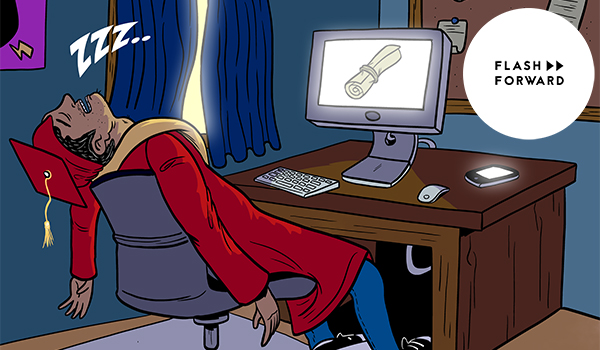
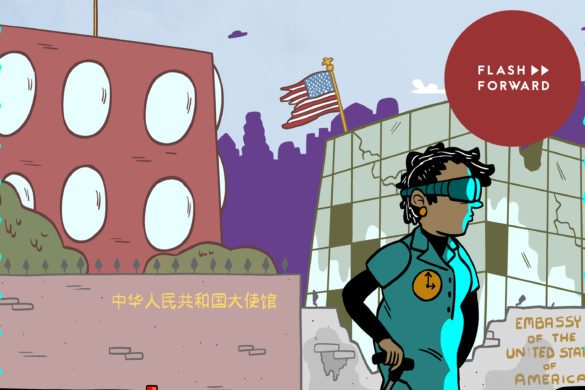
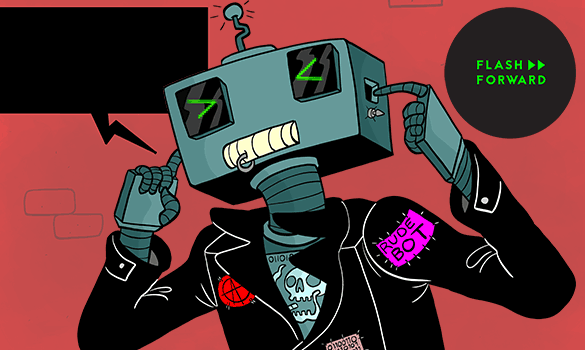

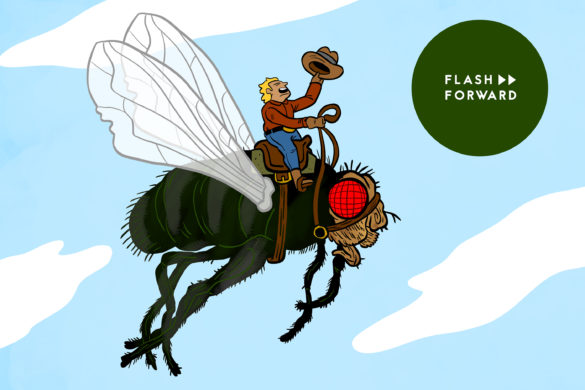

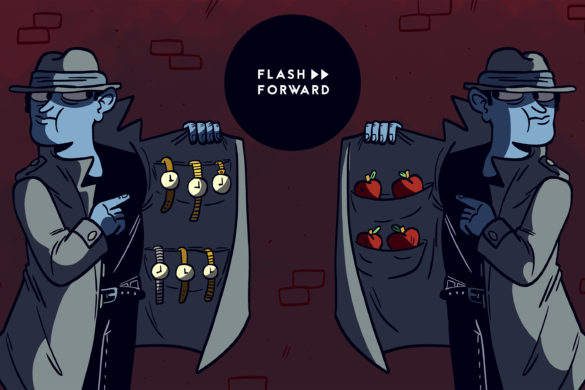
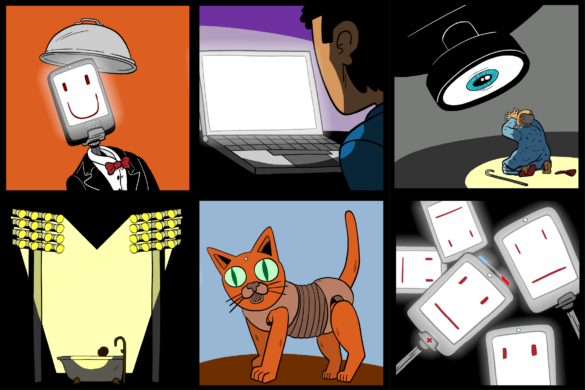

16 comments
Thanks for another great episode Rose! The part with the family that moved from SC to NY was interesting to me because I know that both NY and CA have educational standards that are vastly different from the other states. Almost any child arriving to NY or CA will be behind the standards for those states. This brings up concerns about standards in general – I remember fellow students having panic attacks because they weren’t going to pass a NY Regents class to get the Regents diploma that literally no other states care about – it was sad. As shown by the child that wanted a robot teacher because it would place him into a higher level class at the beginning of the year, everyone is hung up on standards and levels rather than individualism. A true ‘robotic’ education system would tailor curriculum for each individual student and keep all the level-based accounting (child A is at X level, child B is at Y level, etc) to itself behind the scenes so that the students can focus on the social side of life rather than where they fit in on some state education system chart. I believe that our current education system is based on standards and levels simply because there are too many children which prevents any human based education system from creating individualized curriculum – it is impossible for the underappreciated teachers to account for each child individually… but a digital system can easily do this. The future of education as I see it is one in which digital systems create and maintain pathways for individuals to learn according to their unique qualities and humans interact with each other for personality and creative traits – a teacher will become an advisor/mentor while the robots present educational material in ways that each person can understand.
Hi Robert!
Yes, standards and testing is something I talked to both Jade and Audrey about but that I couldn’t quite fit into the episode. It’s a good question: how do we tell that a student “gets it” and should move on or be moved around? Can teachers tell? Are computers better? How important is testing anyway? All stuff I couldn’t fit into the episode, sadly!
Thanks for listening!
[…] ▹▹ Full show notes […]
[…] ▹▹ Full records show […]
[…] ▹▹ Full show notes […]
[…] ▹▹ Full show notes […]
[…] week it was Robot teachers and whether that’s a good idea or not. After all, schools and teachers are much more than […]
I feel like you missed out on a huge part of why robot teachers are appealing to specific people, the kinds of people who run tech companies. For certain students school is a hell of boredum and torment from other kids. I have loved the idea from the moment I heard it, a system where I could go as fast as I wanted and not have to sit through dumb questions and lectures on things I already understood, not have to do busy work that was arbitrary and pointless. From grade 4 to 10 I spent the majority of my time at school reading novels because i’d already learned what was being taught or finished the work. It was infuriating and actually ruined me for later school because I’d never learned how to be in a classroom so by the time the curriculum caught up to my knowledge I was trying to function in a classroom with no classroom skills. When I look at an idea like this, I see the freedom to escape a rigid school system that didn’t fit me and hurt me, a personalized school that would speed up or slow down as I needed, it’s not so much the tech that appeals as it is the personalization.
Really loved the part of about how it could come to reinforce classism because i’d never thought about that! Thanks for the hard work, Love the podcast!
I also attempted one Coursera course and dropped out. I got stuck at a certain point (midway) and was unable to get any help from any of the offered methods of interface. Real people have to be available even if automation is used. I taught myself to use computers and built a career with them. I am now retired but will always be learning.
[…] Flash Forward – Bot for Teacher […]
[…] are many creating craft Bot for Teacher books out available, for every single celebrity. Indeed, looking at an internet report is quite […]
[…] Flash Forward – Bot for Teacher Today a future without schools. Instead of gathering students into a room and teaching them, […]
[…] a mission is not understood by you Bot for Teacher, you shouldn’t be reluctant to request an explanation. The important strategy is that your […]
[…] Flash Forward – Bot for Teacher Today a future without schools. Instead of gathering students into a room and teaching them, […]
[…] Flash Forward – Bot for Teacher Today a future without schools. Instead of gathering students into a room and teaching them, everybody learns on their own time, on tablets and guided by artificial intelligence. Listen: Apple Podcasts | Google Play // 38 minutes, June 2016 […]
[…] custom written dissertation, we’ll begin working on your purchase. There may be just two ways Bot for Teacher for you to handle your dissertation writing. Writing a dissertation competently demonstrates that […]